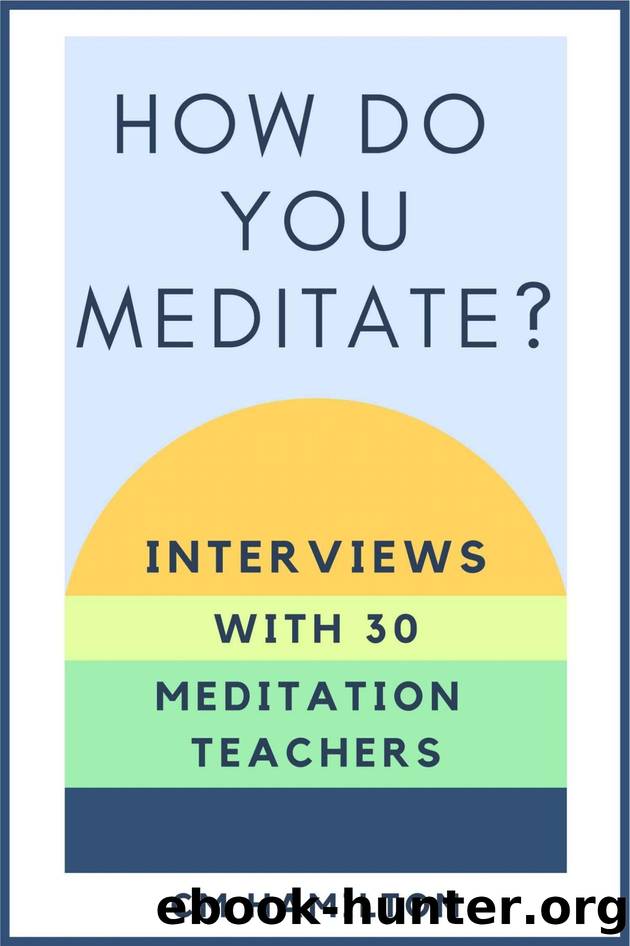How Do You Meditate?: Interviews with 30 Meditation Teachers by CM Hamilton

Author:CM Hamilton [Hamilton, CM]
Language: eng
Format: epub
Published: 2020-02-01T07:00:00+00:00
- - -
Stephen McManus
Bio: Stephen McManus is a meditation and yoga teacher, and director of Three Jewels in New York City, a studio which integrates yoga, meditation and Tibetan Buddhism. He was originally introduced to yoga and meditation by his mother as a child, and returned to it as an adult as a way to cope with anxiety and stress. Clay Hamilton interviewed Stephen in autumn 2019.
Contact: threejewels.org
Quote: âYou should do yoga if you meditate! And you should meditate if you do yoga! They are made for each other.â
o o o
1. Briefly describe yourself as a meditation teacher.
My entire life is woven around my spiritual practice. My partner and I run Three Jewels as well as teach there. There is no separation between work life, love life, and meditation life, and somehow we make it work really well. Three Jewels is an âEnlightenment Studioâ that teaches yoga, meditation, and Tibetan Buddhism. There are a lot of different types of meditations within Tibetan Buddhism but lately I have been focusing a lot on opening the heart and cultivating compassion.
2. How did you first learn to meditate and why/how did you become a meditation teacher?
I grew up meditating because of my mom, but I didnât get serious about it until college when I used it to cope with anxiety. After college I moved to New York City and met Hector Marcel, who introduced me to Tibetan Buddhism. After practicing meditation more seriously for a couple of years, I did the Meditation Teacher Training at Three Jewels to go deeper in my own practice. But, as with anything that you learn, eventually you share it. Thatâs how I started teaching.
3. What types of meditations have you studied or practised, and what method do you mainly use or teach now?
I have practiced a lot of vedic meditations growing up and now I practice mostly Buddhist meditations, but they are all the same more or less. They all point to the same thing.
4. What is the greatest benefit you personally get from meditation?
Connection and compassion. I feel much more connected to others.
5. What is your favourite meditation technique or form of practice?
Tong Len. Itâs a Tibetan meditation that means âGiving and Takingâ. You take away others suffering and send them love and wisdom.
6. Is it more useful for people to know many meditation techniques, or to learn one/few and focus efforts on practising that one?
I think itâs useful to know more, but to practice one of them for a couple of months at a time.
7. What do most students struggle with or get wrong?
A lot of people think meditation is to stop thinking. Thatâs not going to happen.
8. What important aspect of meditation do you find yourself teaching over and over again? Is there a phrase or message or quote you repeat to students again and again?
Each cycle of breath is a meditation.
9. How many times and how much time per day do you recommend students to meditate?
Start with 5 minutes every day, then add 1 minute every week.
Download
This site does not store any files on its server. We only index and link to content provided by other sites. Please contact the content providers to delete copyright contents if any and email us, we'll remove relevant links or contents immediately.
Happiness by Matthieu Ricard(3040)
How to Stop Worrying and Start Living by Dale Carnegie(2705)
Getting Things Done by David Allen(2689)
The Chimp Paradox by Peters Dr Steve(2372)
What I Need by J. Daniels(2075)
The Empath's Survival Guide by Judith Orloff(2056)
The Finnish Way by Katja Pantzar(1990)
The Smartest Kids in the World by Amanda Ripley(1843)
Jealousy by Osho(1747)
Everything in Its Place by Dan Charnas(1734)
The Joy of Hygge by Jonny Jackson(1722)
Free Yourself from Fears by Joseph O'Connor(1636)
Who Moved My Cheese?: An Amazing Way to Deal With Change in Your Work and in Your Life by Johnson Spencer(1628)
Don't Sweat the Small Stuff at Work by Richard Carlson(1556)
Think Happy to Stay Happy by Becca Anderson(1507)
How to Build Self-Discipline to Exercise by Martin Meadows(1506)
Coping with Anxiety by Edmund Bourne & Lorna Garano(1501)
The Secret History of Freemasonry by Paul Naudon(1483)
Expectation by Anna Hope(1458)
